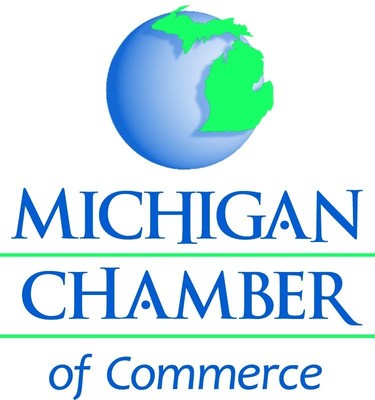LANSING, Mich., April 14, 2021 /PRNewswire/ -- The Michigan Chamber, Michigan Licensed Beverage Association, Michigan Manufacturers Association and Michigan Retailers Association are expressing major concern as a Michigan Occupational Safety and Health Administration (MIOSHA) Advisory Committee completed its scheduled work and MIOSHA announced its plans to move forward with extending overly-restrictive COVID-19 workplace rules on a permanent basis. The business groups voiced concern over how the permanent rules could come to conflict with Center for Disease Control (CDC) recommendations and current science and will adversely impact jobs and hurt the economy.
The MIOSHA Advisory Committee is separate, but related, to the on-going "Return-to-Office Workgroup" recently established by Gov. Gretchen Whitmer. That workgroup is charged with informing Michigan Department of Health and Human Services (MDHHS) orders and MIOSHA rules for employers to use in planning their own phased reopening.
The MIOSHA General Industry and Construction Safety and Health Standard Advisory Committee for Part 505, Coronavirus Disease 2019 ("Committee") was charged with advising MIOSHA on "permanent" COVID-19 workplace safety rules. The permanent rules would cover both general industry and construction employers and be promulgated through the regular rulemaking process to take effect in six to 12 months.
"From the beginning, it was clear the goal was to push through a recommended rule set that endorsed the status quo," said Wendy Block, Vice President of Business Advocacy and Member Engagement for the Michigan Chamber, who was a voting member of the Committee. "With a Committee make up of four voting union representatives and four voting representatives of management, and a requirement that it would take at least five votes to make any changes to the current COVID-19 Emergency Rules, the deck was stacked against change from the beginning."
"We need reasonable long-term solutions that recognize the COVID-19 emergency will end at some point in the future," said Dave Worthams, Director of Human Resource Policy for the Michigan Manufacturers Association, who served as the non-voting chairman of the Committee and Technical Advisor. "Unfortunately, there seemed very little willingness to find solutions.
"Michigan businesses cannot be handcuffed permanently and compete effectively in the global economy," continued Worthams.
"The Committee debated numerous proposals to follow the science and CDC guidelines, but the proposed changes were rejected because of a lack of 'consensus'," said Scott Ellis, Executive Director of the Michigan Licensed Beverage Association, who served as a Technical Advisor to the Committee. "This process did not reflect reasonable discussion or decision making.
"If the agency proceeds with these rules as written, they will further damage Michigan's business climate," continued Ellis.
"We are extremely disappointed in the process and the outcome," said Amy Drumm, Vice President, Government Affairs for Michigan Retailers Association, who served as a Technical Advisor to the Committee. "Although we were hopeful that this committee could discuss reasonable updates to keep workplaces safe to operate while being responsive to the frequently changing requirements necessitated by the COVID-19 pandemic, after four weeks and nearly 20 hours of meetings, we are back to square one."
"The permanent COVID-19 workplace safety rules MIOSHA is pursuing keeps government's thumb on decisions best left in the workplace between employers and employees," concluded Block. "This one-size-fits all rule set does not account for vaccine rollout and herd immunity and does nothing to help businesses or our economy move forward."
The make-up of the General Industry and Construction Safety and Health Standard Advisory Committee included eight voting members, including four union representatives (Michigan Nurses Association, AFSCME Local 875, West Michigan Plumbers, Fitters and Service Trades Local 174 and the Michigan Building and Construction Trades Council) and four business representatives (National Electrical Contractors Association, Associated General Contractors of Michigan, Michigan Chamber of Commerce, Michigan Health & Hospital Association). In addition, there were several "technical" advisors who were non-voting members. Companies represented as technical advisors included: CAO Consulting LLC, The Christman Co., Michigan Licensed Beverage Association, Michigan Retailers Association, Michigan Manufacturer's Association and Blue Cross Blue Shield of Michigan.
MIOSHA is relying on the process for creating, amending, and rescinding administrative rules. It is governed by the Administrative Procedures Act, 1969 PA 306, MCL 24.201 to 24.328 and explained here. MIOSHA has already submitted a Request for Rulemaking (RFR) to the Michigan Office of Administrative Hearings and Rules (MOAHR) and is now submitting draft rules to MOAHR to review for legal authority. It is estimated the rulemaking process will take 6 to twelve months, at which time the rule will take effect (i.e., any time between October 2021 and April 2022).
SOURCE Michigan Chamber of Commerce

